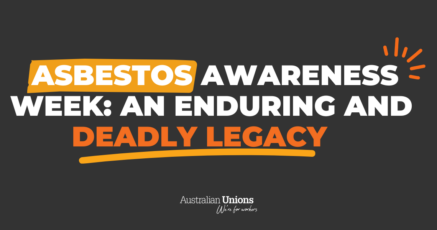The Hollywood image of the flight attendant – the carefree individual jetting off to glamorous locations around the globe, meeting exciting new people, all the while being paid for it – is just that. An image.
Flight attendant Alex is all too familiar with the reality of the job, describing the personal cost to mental health that comes with the constant commute.
“It’s time that crew have away from their families that affects peoples dramatically. We can be away at three or four days at a time not seeing kids and family,” he says.
Of course, it is not only cabin crew who face everyday stress at work. Australian Nursing and Midwifery Federation OHS Officer Craig sees what workers in our hospitals have had to endure due to short staffing.
“We need a lot more nurses out there. It’s really tough on our members at the moment, doing double shifts and a lot of overtime and working short. Just really burned out and fatigued,” Craig says.
A one day check in just doesn’t cut it
If your employer is relying on days like R U OK to check in on your mental health – or worse, requesting workmates check in on each other one day a year without support from management – then that’s a huge red flag.
Independent Education Union organiser Emma knows the dire consequences this type of approach to mental health can have on schoolteachers.
We all know that teachers are leaving in droves. Teachers and support staff are leaving because they’ve been given an unsafe workload for years. It’s unsafe. They all know it. There’s very little protection at the moment and employers just don’t want to know about it.
Emma
Independent Education Union organiser

“A lot of workplaces like schools attempt to address psychosocial hazards as a problem with the worker… in schools it’s the work that’s unsafe. It’s not the worker that needs fixing. The work is broken,” Emma said.
It’s important to have Health and Safety Representatives (HSRs) to assist you when talking to your employer about mental health hazards.
Why HSRs are essential for your workplace
A member of the Flight Attendants Association of Australia, Alex is the elected HSR of his team. He communicates and represents the health and safety concerns of his workmates to management.
Our management team are not that supportive of the crew at the moment so at least we’re that middle ground and they come to us with anything they have and we can bring it to our company’s attention.
Alex
Flight attendant & Health and Safety Representative

If you think there are mental health hazards at your work, raise it with your Health and Safety Representative and report any hazard to your employer. HSRs can represent you when raising issues with management.
In many schools, there is a lack of knowledge among management about the role of HSRs. Considering how important they are to protecting teachers’ wellbeing, introducing HSRs into schools are a fundamental step to improving the learning environment for both teachers and students.
“There is an effect on students,” Emma says.
“Teachers tell us they are not teaching as well as they would like to. They’re fatigued, they’re stressed, they’re anxious. They’re just doing too much,” she says.
Craig agrees that all workplaces need HSRs to ensure the wellbeing of workers.
“It’s really important to get as many as we can into workplaces,” he says.
The best move for your mental health at work
One of the reasons why HSRs are crucial is they can help raise mental health safety to the same level as physical health and safety.
Your best protection at work is union membership. If you don’t have an HSR at your work, the first step is for you and your workmates to join your union and elect an HSR.
If you are an HSR, the Mind Your Head resources provide extensive information on how mental health factors into our working lives.
Mind Your Head has examples of everyday workplace experiences that may negatively affect our mental health. Use these resources to out into words the risks that you may be facing.
Alex explains that you can see the practical effects of having HSRs at work in how management treat their employees.
“A thing for me is having the managers actually trained to notice when crew are down, or when they’ve got mental health problems. Because having ‘R U OK days’, having certain days of the year that are focussed on it, we actually need to focus on it for 365 days.”








SHARE:
How unions make workplace mental health more than an annual check-in